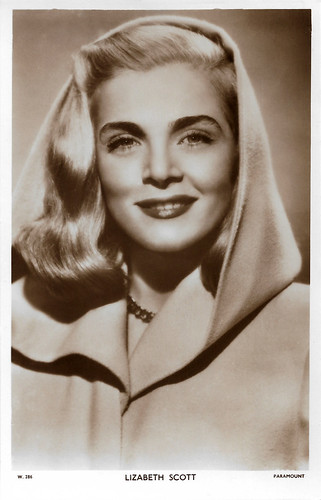
British postcard in the Picturegoer Series, London, no. W. 286. Photo: Paramount.

Italian postcard in the Divi del Cinema Series by Vetta Traldi, Milano, no. 12. Sent by mail in 1955.
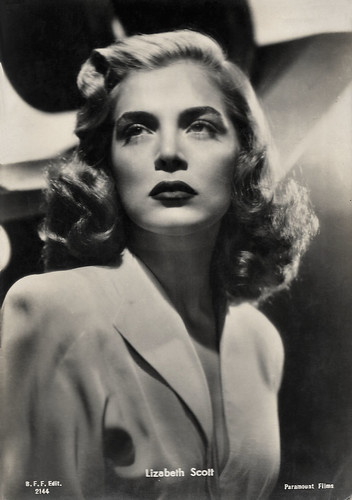
Italian postcard by B.F.F. Edit. (Casa Edits. Ballerini & Fratini, Firenze), no. 2144. Photo: Paramount Films.
Beautiful, blonde, aloof and alluring
Lizabeth Scott was born Emma Matzo in 1922, in Scranton, Pennsylvania, where her parents, John Matzo and Mary (nee Pennock), had a grocery store. Despite her parents’ opposition to an acting career, she went to the Alviene Master School of the Theatre and Academy of Cultural Arts in New York in her late teens. Here she adopted the stage name of Elizabeth Scott.
She landed a small role in a touring company of the hit stage comedy 'Hellzapoppin'. Back in New York, unable to get an acting job, she landed work as a fashion model with Harper’s Bazaar at $25 an hour. In 1942, she got a small part in the original Broadway production of Thornton Wilder's 'The Skin of Our Teeth'. Scott also understudied Tallulah Bankhead, who played the lead role. The tempestuous Bankhead, who did not get along with Scott, stubbornly never missed a performance. In Boston, Scott finally got to play the lead role, taking over from Miriam Hopkins.
She decided to remove the 'E' from Elizabeth Scott to be more distinctive. It would be either this performance or a four-picture spread in an issue of Harper’s Bazaar (the sources differ about this) that led to a long-term Hollywood contract with Hal Wallis, who had his own producing organisation through Paramount Studios. Scott": It was off-season on Broadway and since I wasn’t able to find a job there, I thought it might be a good experience to come to Hollywood and find out what it was all about.”
Wallis introduced his 22-year-old discovery as “beautiful, blonde, aloof and alluring”. Scott's film debut was the comedy-drama You Came Along (John Farrow, 1945) opposite Robert Cummings. In her second film, The Strange Love of Martha Ivers (Lewis Milestone, 1946), she played a young woman wrongly jailed, opposite Barbara Stanwyck, Kirk Douglas and Van Heflin. She made more of an impression in Dead Reckoning (John Cromwell, 1947) as a gangster’s wife, almost luring Humphrey Bogart into her corruptive trap. Her mysterious character was shot in oblique angles and low-key lighting. Stylishly dressed by Edith Head, she played the good girl gone bad becoming good again in the melodrama Desert Fury (Lewis Allen, 1947).
Billed as “the blonde with the brown voice”, Scott played a nightclub singer in I Walk Alone (Byron Haskin, 1948), also starring Kirk Douglas and Burt Lancaster. She was more decadent than ever in Too Late for Tears (Byron Haskin, 1949), having killed two husbands because she wanted “to move out of the ranks of the middle-class poor”. Scott was her own woman in the world of hard-boiled film crime. Ronald Bergan at The Observer: "Scott was strong and sultry, her heavy dark eyebrows contrasting with her blonde hair. Like [Lauren] Bacall, she had a low and husky voice, but she was far harder; in fact, she was able to suggest hidden depths of depravity – the ideal femme fatale of the 1940s."
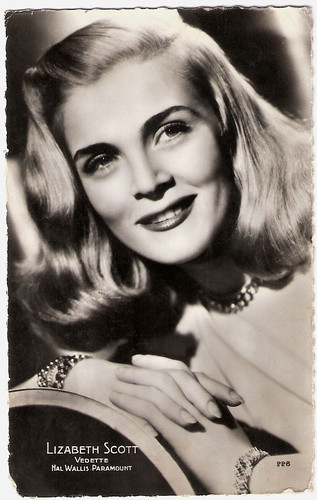
French postcard by Editions P.I., Paris, no. 228, offered by NV Victoria, Brussels, no. 639. Photo: Hal Wallis / Paramount, 1950.
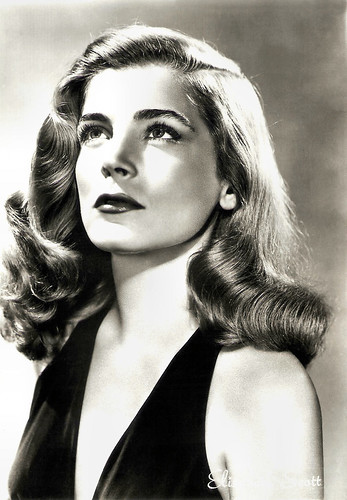
Italian postcard by Rotalfoto, Milano, no. 64. Photo: Columbia CEIAD.

French postcard by Editions P.I., Paris, offered by Les Carbones Korès, no. 356. Photo: Hal Wallis / Paramount Pictures, 1950.
Confidential
In her films, Lizabeth Scott made some memorable quotes. In Pitfall (André De Toth, 1948), she described herself to Dick Powell as "a girl whose first engagement ring was bought by a man stupid enough to embezzle and stupid enough to get caught." In The Racket (John Cromwell, 1951), she asked Robert Mitchum: "Who said I was an honest citizen, and where would it get me if I was?"
In another Film Noir, Dark City (William Dieterle, 1950), she is a nightclub singer again who drifts on the edges of a shadowy criminal world, though her love for a gambler (Charlton Heston in his Hollywood debut) is uplifting. Heston and Scott were reunited for Bad for Each Other (Irving Rapper, 1953). She played several similar roles of a woman willing to change her louche ways but doomed to find a worthwhile man to love her only when she had already passed the point of redemption.
After several years of making one Film Noir after another — sometimes at a pace of two or three in a year — Scott was ready for a change. She got it in the comedy Scared Stiff (George Marshall, 1953), starring Dean Martin and Jerry Lewis. In September 1954, a front-page story in the magazine Confidential claimed that Scott was a lesbian and was linked to “the little black books kept by Hollywood prostitutes”. It was also said that on a trip to Paris, she had taken up with Frédérique 'Frédé' Baulé, manager of Carroll's, an upper-class, cabaret-type nightclub in Paris. One of the owners was Marlene Dietrich.
Two months before the issue's printed publication, her lawyer had instituted a $2.5m suit against Confidential, accusing the magazine of “holding the plaintiff up to contempt and ridicule and implying in the eyes of every reader indecent, unnatural and illegal conduct in her private and public life”. Scott lost her suit on a technicality, however, and, given the witch-hunting atmosphere of the times, the case certainly harmed her. Compounding her plight was her rebellious nature, having never paid conventional homage to the film establishment and to gossip columnists Louella Parsons and Hedda Hopper.
In 1955, Scott went to Great Britain to film The Weapon (Val Guest, 1957). As with other European films of the 1950s- 1970s period aimed at a US audience, Scott starred with another American actor, Steve Cochran, who played US Army CID officer Mark Andrews. Scott also played a publicity woman in the Elvis Presley vehicle Loving You (Hal Kanter, 1957). In 1957, she also released an album of torch songs and romantic ballads titled 'Lizabeth'. She had a few TV roles in the 1960s. Her last credited movie appearance was as a man-eating cougar in Pulp (Mike Hodges, 1972), a sendup of the Film Noir starring Michael Caine. One of her ex-husbands in the film is played by Mickey Rooney.
Scott lived quietly in Hollywood, sometimes accepting invitations to attend film festivals and other events. In a 1996 interview with documentary filmmaker Carole Langer, Scott said she had liked the grittiness of Film Noir and didn't lament the fact that she wasn't cast in studio blockbusters: "The films that I had seen growing up were always, boy meets girl, the boy ends up marrying girl, they go off into the sunset," Scott said. After the war, films got more in touch with "the psychological, emotional things that people feel and people do. It was a new realm, and it was very exciting because suddenly you were coming closer and closer to reality." Lizabeth Scott died in 2015 at Cedars-Sinai Medical Center in Los Angeles. She was 92. The cause was congestive heart failure, said her long-time friend Mary Goodstein. Scott's survivors include her brother Gus Matzo and sister Justine Birdsall.

Dutch postcard by Uitgeverij Takken, Utrecht, no. 3823, 1958. The photo of Elvis Presley and Lizabeth Scott was a publicity still for Loving You (Hal Kanter, 1957).
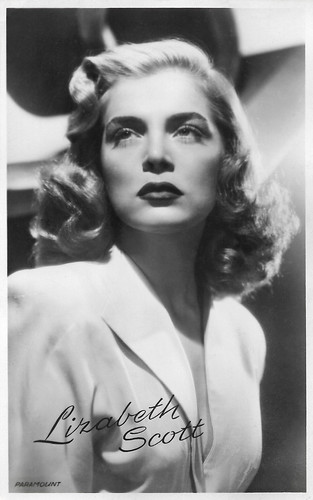
Vintage postcard, no. 3396. Photo: Paramount.
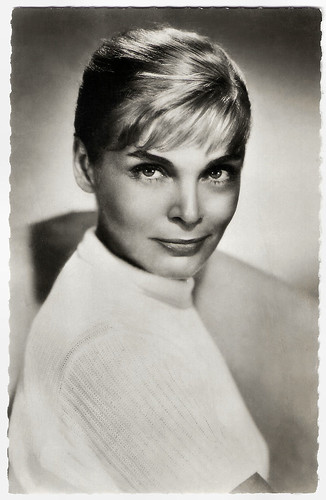
French postcard by Editions P.I., Paris, no. 876, offered by Les Carbones Korès 'Carboplane'. Photo: Paramount Pictures.
Sources David Colker (Los Angeles Times), Ronald Bergan (The Observer), Mike Barnes (Hollywood Reporter), Variety, Wikipedia and IMDb.
No comments:
Post a Comment